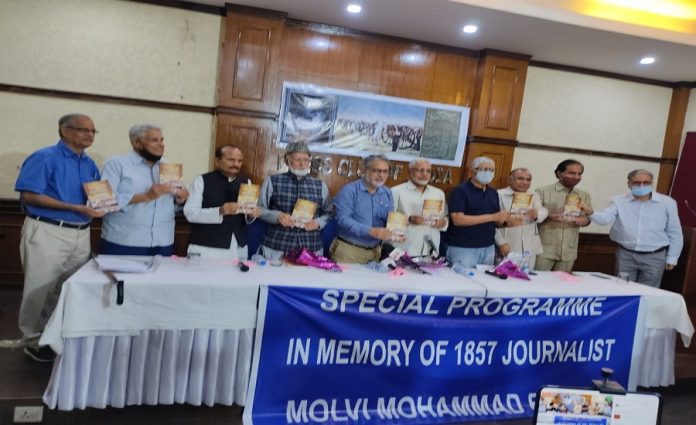By S.A.H. RIZVI
New Delhi Bureau Chief
The Times Kuwait
Journalists across the board in New Delhi assembled at the Press Club of India for a seminar to commemorate the death anniversary of martyr Maulvi Mohammad Baqar, the first journalist who was executed by the British following the Indian rebellion of 1857.
Maulana Baqar was the editor of ‘Delhi Urdu Akhbar’, an Urdu weekly in Delhi believed to be the first Urdu newspaper of Delhi and which played a crucial role in uniting people against the British atrocities.
Though Maulana had started this newspaper in 1836, by July 1857, he got so involved in the rebellion since he was quite close to emperor Bahadur Shah Zafar, a leader of the revolt, that he renamed the newspaper as ‘Akhbar al Zafar’.
Maulana Baqar who became an epitome of Hindu Muslim unity was arrested on 14 September, 1857, as soon as the city fell to the British. The Russian war painter Vassili Verestchagin (1842-1904) painted a picture of British punishing Indians after the mutiny and an old Maulana tied to the canon to be blown was believed to be Maulana Baqar.
However popular this narrative is, historians say it is incorrect, as Baqar was shot dead on 16 September perhaps by Captain Hudson who ordered his execution.
But regardless of the way of his execution, it is evident that he was the first journalist who laid his life for the country.
A Hindi translation of the book titled ‘1857 Ki Kranti Aur Urdu Patrkarita’ (The Revolution of 1957 and Urdu Journalism) authored by veteran Urdu journalist Masoom Moradabadi was released at the seminar. It chronicles the life of Baqar as a journalist and freedom fighter.
Masoom Moradabadi, a tall name in current Urdu journalism, has many books to his credit besides his own newspaper Khabardar. He gave a new definition to Urdu journalism through his incisive reporting and writing, that won him several awards
A number of veteran journalists and writers spoke on the occasion paying tributes to the ‘first martyr journalist’. They described Baqar as an icon of Hindu-Muslim unity whose ideals are increasingly relevant in the present times.”
“Maulvi Muhammad Baqar was one of the great journalists who preferred martyrdom to collaboration with Britishers,” A.U. Asif, a senior journalist and member of Press Club’s managing committee, said. “He is an ideal and role model for the new generation of journalists.”
Satish Jacob, a BBC veteran, said Baqar was a journalist who sacrificed his life for the sake of the nation. He described him a proponent of Hindu-Muslim unity.
Jacob said he is proud of the fact that he himself hails from Old Delhi, a place that gave birth to a person like Baqar. He said that Baqar had started an Imam Barah in the Kashmere gate area which is still functioning. The Imam Barah was built with the expressed goal of communal harmony, he added.
Maroof Raza, a defence expert, appealed for steps to find the original source and preserve the archives of ‘Delhi Urdu Akhbar’, the newspaper Baqar published.
Jai Shanakar Gupta, senior journalist and a member of the Press Council of India, also urged the government to get copies of the newspaper that Baqar edited from Britain, where they are lying in a museum.


















